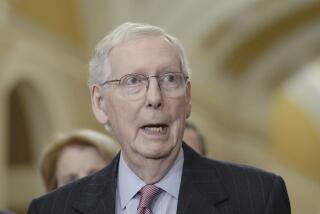U.S. spy chief calls warrantless wiretapping discussion a threat
WASHINGTON — The nation’s top spy told Congress on Thursday that the public debate over the Bush administration’s controversial warrantless wiretapping program would lead to American deaths by revealing sensitive surveillance methods to potential terrorists.
J. Michael McConnell, director of national intelligence, testified that congressional examination of laws that govern the program, known as the Foreign Intelligence Surveillance Act, ran counter to established precedents. Under these, he said, “intelligence business is conducted in secret.”
“It’s conducted in secret for a reason,” McConnell told the House Intelligence Committee. “You compromise sources and methods, and what this debate has allowed those who wish us harm to do is to understand significantly more about how we were targeting their communications.”
Asked by Rep. Anna G. Eshoo (D-Menlo Park) if he thought that congressional questioning of the administration’s intelligence program would lead to the killing of Americans, McConnell said, “Yes, ma’am, I do.”
Eshoo called his assessment “a stretch.”
It was not the first time the Bush administration and its allies had charged that Democratic opposition to White House policies would compromise national security.
In January, Republican lawmakers and Army Gen. David H. Petraeus, the Iraq war commander, suggested that a Democratic-backed resolution condemning President Bush’s plan to increase troop levels would undermine U.S. troop morale.
The accusation enraged Democratic leaders, who accused the administration of unfairly attempting to stifle debate over the war. The issue largely disappeared after Defense Secretary Robert M. Gates publicly asserted that Democratic pressure was actually having a beneficial effect by intensifying pressure on Iraqi leaders to reach a political compromise.
McConnell’s remarks came as Congress again was considering modifications to the surveillance law. The Democratic leadership rushed through temporary revisions of the law last month after McConnell warned that a secret court’s ruling had made some parts of Bush’s surveillance program illegal.
But those revisions expire after six months, and Democrats charge that McConnell strong-armed them into approving changes that threaten privacy protections for U.S. citizens.
McConnell, who wants the August reforms made permanent, attempted to illustrate the dangers presented under previous versions of the law. He said that prior to the recent reforms, the National Security Agency in one instance this year was forced to wait 12 hours for a court- approved warrant to listen to phone conversations between Iraqi insurgents who were holding American soldiers hostage.
Despite McConnell’s efforts, it was clear that the summer battle damaged his credibility among Democrats. Intelligence Committee Chairman Silvestre Reyes (D-Texas) accused McConnell of backing out at the last minute from an agreement the two sides had reached in August on compromise legislation.
Rep. John Conyers Jr. (D-Mich.), chairman of the House Judiciary Committee, made similar allegations against McConnell this week.
McConnell argued that he turned against the compromise language after consulting with his lawyers. He said they convinced him that the bill may force the NSA to get a warrant when listening to conversations of foreign suspects overseas. They traditionally have not received such protections.
“I was put in a position where I could do nothing but say I can’t support it because we hadn’t had a chance to examine it,” McConnell said.
The national intelligence director has also angered members of Congress in both parties by revealing once-classified portions of the intelligence program. They include the fact that about 100 people inside the U.S. are under surveillance by intelligence agencies. McConnell divulged that in an interview with a small Texas newspaper last month, even as he told members of Congress that the information could not be shared publicly.
Rep. Darrell Issa (R-Vista) criticized McConnell for “selectively” providing information to lawmakers while leaking data elsewhere. “I would hope that we could change the policy starting today,” Issa said.
--
More to Read
Sign up for Essential California
The most important California stories and recommendations in your inbox every morning.
You may occasionally receive promotional content from the Los Angeles Times.










